 Bush delivered his long-distance lecture to the world body from the 2002 campaign stump, appearing in South Dakota for Republican candidates. "You need to do your job," he exhorted the U.N.
Bush delivered his long-distance lecture to the world body from the 2002 campaign stump, appearing in South Dakota for Republican candidates. "You need to do your job," he exhorted the U.N.
The president previously had accused the United Nations of risking irrelevance if it did not agree with the United States on a tough resolution.
...
Refusing to cooperate with inspections is "an immediate red line," Powell said, as he showed little inclination to shade the strong stand the Bush administration has taken against Saddam.
"At no time will the United States foreclose its ability to act in its interest in accordance with its constitutional obligation to protect the nation and protect the people," he said at the State Department.
» Yahoo! News - Powell Stern With U.N. on Iraq
Journalists would learn about military customs, ammunitions, basic first aid and how to protect themselves in the event of nuclear, chemical and biological attack. They also would learn about the rules of engagement, the U.S. command structure and military customs, according to a memo sent to bureau chiefs in Washington.
...
"We think this training is an excellent idea. AP journalists will benefit from it, and the commanders will become more comfortable with the media,'' said Mike Silverman, managing editor of The Associated Press. "If there is a war with Iraq, we hope the Pentagon will allow journalists to move quickly into the theater and embed with military units at the front.''
» Combat Class Offered to Journalists
It's not clear whether Saddam uses e-mail or even knows how to operate a personal computer. But scores of people write to him each week at press@uruklink.net, the e-mail address listed on the official homepage of the Iraqi presidency since at least October 2000
...
The e-mails sent to press@uruklink.net were obtained earlier this month by first clicking on a link labeled "Check your e-mail in Uruk" on the homepage of Iraq's state-controlled ISP, Uruklink.net, then guessing the login name and password -- both of which were the same five-letter word.
"This is a man who told the world that he wouldn't have weapons of mass destruction. He's got weapons of mass destruction. This is a man who has used weapons of mass destruction," Bush said. "He's used them against his neighbors. He's used them against his own people. This is a person who can't stand America. This is a man who's had contact with al-Qaida. This is a man who has defied international bodies."
"This is a person," Bush said, "who has made the United Nations look foolish."
In Denver, he said, "The leaders of the free world have a choice to make as to whether or not Saddam is going to be allowed to defy their resolutions and weaken their capacity to keep the peace."
Earlier, the president's spokesman said the United Nations doesn't have much longer to save face.
"This is coming down to the wire," White House spokesman Ari Fleischer told reporters aboard Air Force One. "The United Nations debated this long enough."
"The time has come for people to raise their hands and cast their vote to either announce they will return to the way of the '90s - a weak, ineffective system of inspections - or recognize that Saddam Hussein is taking advantage of weakness and the world needs to do something different," Fleischer said.
» Bush Says Saddam Makes United Nations 'Look Foolish'
"If the United Nations won't act, if Saddam Hussein will not act, if he continues to defy the world, the United States in the name of peace will lead a coalition to disarm Saddam Hussein," Bush said to a standing ovation from Republican faithful at a political rally at Phoenix's Dodge Theater.
White House spokesman Ari Fleischer, who said on Saturday it would not be hard at all to form a coalition against Iraq, told reporters on Bush's plane on Sunday that the U.N. negotiators are facing a key week.
"We will see what happens in New York. This is the United Nations' chance to do some good or this is the United Nations' chance to fail," Fleischer said.
» Bush Urges U.N. Act on Iraq for Sake of Peace
A quick, decisive war in Iraq would barely affect the U.S. economy, but a drawn-out conflict with a sustained rise in oil prices could cut growth in 2003 by a percentage point, a Reuters poll of economists found.
...
"It's tricky," said Chris Rupkey, senior financial economist at Bank of Tokyo/Mitsubishi. "If the government ramps up military expenditures, it could offset whatever decline we see in business and investment spending.
...
A war on Iraq has been variously estimated as potentially costing the United States between $50 billion and $200 billion. White House officials have called estimates premature.
» Little Effect Seen from Short Iraq War
 Demonstrators gathered in Washington on Saturday to protest a possible U.S.-led war on Iraq with anti-war chants, placards and speakers chastising politicians.
Demonstrators gathered in Washington on Saturday to protest a possible U.S.-led war on Iraq with anti-war chants, placards and speakers chastising politicians.
In addition, similar rallies were planned and held in San Francisco, California, Chicago, Illinois, and cities in Mexico, Japan, Spain, Germany, South Korea, Belgium and Australia.
The organizers say Congress' Iraq resolution is illegal and U.S. President George W. Bush's threats of a possible war against Iraq do not represent the views of the American people.
...
One spokesman said the rally is a rejection of what Bush pushed on Congress and Congress rubber-stamped.
» Global rallies protest possible U.S. war on Iraq - Oct. 26, 2002
The United States Defence Department has confirmed for the first time that it is using armed pilotless aircraft to attack targets which threaten American and British patrols over southern Iraq.
It says the drones - known as Predators - carry missiles which are used to attack a range of targets if Western coalition planes come under fire while enforcing the flight exclusion zone there.
...
The Pentagon insists they are being used in Iraq purely to deal with air defence targets.
» US admits using drones over Iraq
Government officials expressed particular outrage over CNN reporting, specifically its coverage this week of an unprecedented anti-government demonstration outside the Iraqi Information Ministry in Baghdad.
Iraqi officials said they also objected strongly to the presence and reporting of a CNN team in Kurd-controlled northern Iraq.
The government invited in hundreds of foreign journalists to cover an October 15 referendum that officials claimed showed unanimous support for Iraqi President Saddam Hussein to remain in power.
» Iraq orders CNN, foreign journalists out
An Islamic militant faction in the U.S.-protected Kurdish safe haven was created by Usama bin Laden from terrorist cells shifted from Afghanistan just before the Sept. 11 attacks, a top Iraqi Kurdish leader claimed Tuesday.
...
According to Iraqi Kurdish evidence, the core of Ansar al-Islam, or Supporters of Islam, was created 10 days before the Sept. 11 attacks as part of bin Laden's plans to disperse his terrorist network before an expected U.S. strike on Al Qaeda's command in Afghanistan, Salih said.
» Iraqi Kurdish Leader: Local Islamic Militants Have Clear Al Qaeda Links
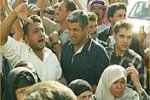 The Iraqi authorities said they had released almost all prisoners and Iraqi television reported on Monday that Iraq's jails were empty.
The Iraqi authorities said they had released almost all prisoners and Iraqi television reported on Monday that Iraq's jails were empty.
In Iraq the only public demonstrations allowed are ones that are officially sanctioned. This one was extraordinary because it was not.
The demonstrators turned up unannounced outside the Ministry of Information, demanding to know the fate of their relatives.
Some said they were waiting for news of family members jailed for over a decade.
» Iraqi protest over missing prisoners
In just the past few years, the whole American doctrine of urban warfare has changed. Where the strategy had been either to avoid cities or to destroy them, under the new doctrine the Pentagon's goal would be to isolate the cities, then selectively attack the pillars of the government. Fighting block by block is considered too risky and too likely to cement popular defiance. Rather, the military hopes Mr. Hussein's government would implode as he loses control over his loyalists.
The Pentagon has identified as many as 5,000 Iraqi foes of President Saddam Hussein for U.S. combat training due to begin next month, a major step toward a possible U.S.-led military attack on Iraq, The Washington Post reported on Saturday.
...
A White House official told Reuters: "It has long been understood that an effective opposition is part of our overall regime-change policy as first outlined in the 1998 Iraq Liberation Act."
That law authorized $98 million for opposition training.
But a directive signed by then-President Bill Clinton restricted spending to nonlethal instruction, a policy retained until now by Bush.
...
"Bush's decision marks another major step forward in preparation for a U.S. military assault on Iraq," the Post said.
U.S. Said to Train Iraqi Exiles for Combat
 President George Bush has come out with what he calls "the National Security Strategy of the United States of America." This 31-page, 12,000-word document is important because it betrays a mind-set and paranoia in Washington DC as regards the world and as regards America's perceived enemies.
President George Bush has come out with what he calls "the National Security Strategy of the United States of America." This 31-page, 12,000-word document is important because it betrays a mind-set and paranoia in Washington DC as regards the world and as regards America's perceived enemies.
...
The security paper sounds arrogant and self-righteous. Consider this passage: "Today, the United States enjoys a position of unparalleled military strength and great economic and political influence. In keeping with our heritage and principles, we do not use our strength to press for unilateral advantage. We seek instead to create a balance of power that favors human freedom: conditions in which all nations and all societies can choose for themselves the rewards and challenges of political and economic liberty. In a world that is safe, people will be able to make their own lives better. We will defend the peace by fighting terrorists and tyrants. We will preserve the peace by building good relations among the great powers. We will extend the peace by encouraging free and open societies on every continent."
» The Manila Times Internet Edition | OPINION > Why Bush wants to invade Iraq
In taking on Saddam Hussein, there is a broader agenda, something of more lasting significance than eliminating the immediate threat posed by his weapons of mass destruction. America's long-term goal is to change the dynamics of the Middle East, the most dangerous region in the world today.
...
The war against terrorism will be long and difficult; so will the American effort in Iraq. Will we be in Iraq for decades, as we have been in Europe and Korea? Perhaps, for it takes years, not weeks, to help nations ravaged by war, terrorism and dictatorship to discover and then begin to practice freedom and individualism.
To achieve these goals America must exercise its power. No one else can, and many nations would not even if they could, so if peace is to be preserved we must preserve it. America will act, Saddam and his terrorist government will be replaced or destroyed, and then the concept of liberty will begin to take root in Middle Eastern society.
» America Commits Itself - Iraq is only the first step in liberating the Mideast
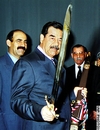 In a speech shown on Iraqi television after he was sworn in for a new seven-year term, Saddam said: "The road of blood takes you to more blood and he who tries to shed the blood of others must expect his blood to be spilled."
In a speech shown on Iraqi television after he was sworn in for a new seven-year term, Saddam said: "The road of blood takes you to more blood and he who tries to shed the blood of others must expect his blood to be spilled."
...
"If God Almighty...decides to put you again to the test in a situation of fighting on a large scale, then the Almighty, the nation and history will expect you to deliver an effective stand...in defense of the homeland...," he said.
» Saddam Says U.S. Will Be Defeated
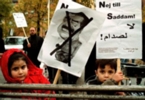 Sweden - Dozens of demonstrators on Tuesday rallied near the Iraqi Embassy and on a downtown square in Stockholm to protest a referendum in Iraq on extending Saddam Hussein's presidency.
Sweden - Dozens of demonstrators on Tuesday rallied near the Iraqi Embassy and on a downtown square in Stockholm to protest a referendum in Iraq on extending Saddam Hussein's presidency.
Saddam faces no challenger in Tuesday's referendum, but the government is seeking the highest percentage of "yes" votes to prove the leader's popularity as a rebuke to the United States. In 1995, 99.96 percent of voters cast "yes" votes.
"We hereby condemn this joke that is being called an election and urge our Iraqi compatriots to refuse to accept it," Gazi Ferman, an Iraqi Kurd organizing the protest on Sergels Torg square, told the crowd.
...
"All Iraqi people are against the Baghdad regime, this is just a false referendum," said one of the protesters, who called himself Salam Ahmed. He declined to give his real name for fear of retaliation.
"Nobody in Iraq dares to say no. People disappear if they show just a little of what they think of the regime," he said
» Swedish Iraqi groups protest referendum on extending Saddam Hussein's presidency
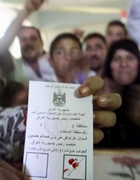 The official result of a referendum in Iraq on extending Saddam Hussein's presidency by another seven years is expected on Wednesday.
The official result of a referendum in Iraq on extending Saddam Hussein's presidency by another seven years is expected on Wednesday.
Correspondents say there is little doubt he will be returned by another massive majority in the tightly controlled vote which offers Iraqis no alternative candidate.
On Tuesday, voters trampled American flags and some signed their ballot-papers in their own blood in a display of loyalty to Saddam.
...
In London, the Foreign Office painted a stark picture of the "choice" facing the Iraqi voters:
"You can't have free elections when the electorate goes to the polls in the knowledge that they have only one candidate, that candidate routinely murders and tortures opponents of the regime and the penalty for slandering that sole candidate is to have one's tongue cut out."
» BBC NEWS | Middle East | Saddam awaits landslide victory
There has been a spectacular surge in support among British voters for military action against Iraq in the immediate aftermath of the terror attack in Bali, according to the latest Guardian/ICM poll.
The survey, which was carried out on Monday, shows that support for a military attack on Iraq has risen 10 points in the last week from 32% to 42% of voters.
...
The level of support for a military attack on Iraq is now at its highest level since the Guardian started a weekly tracker poll on the question in August. Opposition to a war against Iraq reached a peak in the last week of August when it touched 50% and has now fallen to its lowest level at 37%.
Support for a war against Iraq is strongest amongst men - 51% approve as opposed to only 34% of women - and among 25- 34-year-olds who approve by 52% to 25%. Opposition to war is strongest among women - 41% of whom disapprove compared with 33% of men.
» Sharp rise in favour of war on Iraq
WASHINGTON, Oct. 12 -- Defense Secretary Donald H. Rumsfeld said today that he had ordered the military's regional commanders to rewrite all of their war plans to capitalize on precision weapons, better intelligence and speedier deployment. That way, he said, the military could begin combat operations on less notice and with far fewer troops than thought possible -- or even wise -- before the Sept. 11 attacks.
...
The command has stockpiled weapons and positioned some troops in the Persian Gulf in an effort to be able to stage a quick offensive against President Saddam Hussein that planners say would be vastly different from the 1991 war over Kuwait.
» Rumsfeld Orders War Plans Redone for Faster Action
Well, it will not be long now before people, regular folks like you and I, start asking the inevitable question, "What is this war with Iraq all about?" Problem is by then it will be too late. By the time the average American examines this war with anything close to a critical eye, hundreds possibly thousands of people will have already died.
A new poll finds slightly more than half of all Americans favor sending U.S. ground troops into Iraq to remove President Saddam Hussein from power.
» CNN.com - Half of America supports Iraq invasion
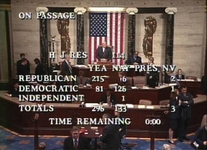 In a major victory for the White House, the Senate early Friday voted 77 to 23 -- joining the House -- to authorize President Bush to commit U.S. troops to enforce U.N. Security Council resolutions requiring that Iraq give up weapons of mass destruction.
In a major victory for the White House, the Senate early Friday voted 77 to 23 -- joining the House -- to authorize President Bush to commit U.S. troops to enforce U.N. Security Council resolutions requiring that Iraq give up weapons of mass destruction.
Hours earlier, the House approved an identical resolution, 296 to 133.
...
The measure passed the Senate and House by wider margins than the 1991 resolution that empowered the current president's father to go to war to expel Iraq from Kuwait. That measure passed 250-183 in the House and 52-47 in the Senate.
» CNN.com - Senate approves Iraq war resolution - Oct. 11, 2002
Experts in and out of government said five U.S. aircraft carriers with 350 warplanes could be off Iraq before year's end if ordered and tens of thousands of troops could be sent much more quickly than the six-months build-up to the 1991 Gulf War.
...
"You could start a reasonably good war in December by getting at least a couple of heavy divisions (about 40,000 troops) into the region," said former Assistant Defense Secretary Larry Korb, now with the Council on Foreign Relations in New York.
"You could start bombing them and initially send troops in from the south and see what happened. That could be accelerated, but if the Iraqi military quickly collapses from air strikes, it's going to take about 100,000 troops to hold down the country," Korb added.
» US Could Be Ready for War in Iraq This Year

The Bush administration remained convinced Iraqi weapons of mass destruction posed a threat to the United States, despite a CIA assessment that Iraq was unlikely to attack or use them unless provoked, a White House spokesman said on Wednesday.
The CIA letter quoted a senior U.S. intelligence official who saw a low chance of an unprovoked Iraqi attack for the foreseeable future and a "pretty high" chance of Baghdad striking out, possibly with biological and chemical weapons, if the United States attacked
» White House Convinced of Iraq Threat Despite Letter
While President Bush marshals congressional and international support for invading Iraq, a growing number of military officers, intelligence professionals and diplomats in his own government privately have deep misgivings about the administration's double-time march toward war.
These officials charge that administration hawks have exaggerated evidence of the threat that Iraqi leader Saddam Hussein poses -- including distorting his links to the al-Qaida terrorist network -- have overstated the amount of international support for attacking Iraq and have downplayed the potential repercussions of a new war in the Middle East.
Iran has added its voice to growing protests over a conservative Christian evangelist in the United States who has described the Prophet Mohammed as a "terrorist".
...
This insult to the holy Prophet Mohammed by a Christian priest is part of a propaganda war by the US mass media and the Zionists," Iranian Foreign Minister Kamal Kharazi said.
...
"I think Mohammed was a terrorist. I read enough...by both Muslims and non-Muslims (to decide) he was a violent man, a man of war," Mr Falwell said.
"In my opinion, Jesus set the example for love, as did Moses, and I think Mohammed set an opposite example."
Mr Falwell is well-known for his inflammatory statements.
...
Other conservative Christian leaders have also made controversial remarks about Islam in the past year, including TV evangelist Pat Robertson who labelled it a religion that sought to control, dominate or destroy others.
» Muslim anger at Prophet slur
...Kurdish groups said they had received secret approaches from military commanders offering to turn their weapons on Saddam when the war began.
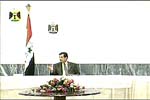 They said members of the al-Majid clan, the pillar of Saddam's tribal power base, had made contact to seek assurances about their fate.
They said members of the al-Majid clan, the pillar of Saddam's tribal power base, had made contact to seek assurances about their fate.
These signs of fragmentation indicate for the first time that Saddam's senior lieutenants believe that the United States and Britain are serious about toppling him.
...
American officials, including Donald Rumsfeld, the defence secretary, have recently spoken of Iraqis eliminating Saddam themselves, either through assassination or by sending him into exile.
Last week, Ari Fleischer, the White House spokesman, said: "The cost of a one-way ticket is substantially less than [the cost of war]. The cost of one bullet, if the Iraqi people take it on themselves, is substantially less than that."
» Saddam's inner circle is defecting, say Iraqi exiles
President Bush's new National Security Strategy offers a bold vision for protecting our nation that captures today's new realities and opportunities.
It calls on America to use our position of unparalleled strength and influence to create a balance of power that favors freedom. As the president says in the cover letter: we seek to create the "conditions in which all nations and all societies can choose for themselves the rewards and challenges of political and economic liberty." This strategy has three pillars:
* We will defend the peace by opposing and preventing violence by terrorists and outlaw regimes.
* We will preserve the peace by fostering an era of good relations among the world's great powers.
* And we will extend the peace by seeking to extend the benefits of freedom and prosperity across the globe.
"We will not enter Iraq as conquerors. We will not treat the Iraqi people as a defeated nation," [senior aide Zalmay Khalilzad] said, reading from a written statement.
He also said it was unlikely Washington would support creation of a provisional post-Saddam government until after Iraq's "liberation."
...
U.S. officials and experts say the success of a war against Iraq would depend heavily on how U.S. forces are received by the Iraqi people and by Iraqi military officers who might be persuaded to rise up against their leader.
...
The administration initially turned down a request to have a senior official discuss Iraq at the conference, but reversed course after public criticism for not participating in a program held on Thursday on plans for a post-Saddam Iraq.
» U.S. Assures It Does Not Seek to 'Conquer' Iraq
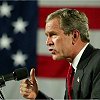
In his weekly radio address, the president continued to make his case for a possible military confrontation with Iraq.
...
In Bush's words, "Delay, indecision, and inaction are not options for America, because they could lead to massive and sudden horror."
...
He said the United States would never seek a war if it weren't essential for justice and peace.
Even before hostilities erupt in a war with Iraq, what happens the day after President Saddam Hussein falls is raising critical questions.
...
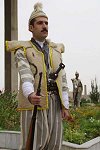
Depending on damage from the fighting, refugee and relief problems that require massive aid could confront the United States. A U.S. military presence to protect Iraq's territorial integrity while a transitional government take over seems certain.
...
Department spokesman Richard Boucher said Friday the United States has worked since April with Iraqi academics and exiles to develop post-Saddam policies in such fields as democratic principles, public accounting and water resources.
...
[Richard] Perle also poured cold water on the idea that the whole of the Arab world would align itself with Saddam in a war.
"This is a demeaning, condescending view of Arabs," he said. "When it becomes clear military action will produce a new future (for Iraq), the Arab world or most if, certainly most of the Muslim world, will consider honor and dignity has been restored by removing a regime they have every reason to despise along with the rest of us."
» Shiites, Sunnis, Kurds could battle to take power in Iraq if Saddam toppled
In a direct message to Iraqi troops, allied forces on Thursday dropped thousands of leaflets over the southern no-fly zone in Iraq warning gunners to stop firing on U.S. and British patrol planes.
Iraqi forces responded by firing on aircraft delivering the leaflets. That led allied forces to bomb an air defense operations center, U.S. Central Command officials said.

An Iraqi vice-president has proposed that Saddam Hussein and George W Bush should fight a duel to settle their differences.
Mr Ramadan, who is not noted for a sense of humour but occasionally resorts to sarcasm, made the proposal in an interview with the Associated Press.
WASHINGTON -- Two Democratic congressmen, brushing off criticisms they were aiding the enemy, said Wednesday their mission to Iraq succeeded in impressing on Iraqis that war was likely if they did not agree to unfettered inspections of weapons stockpiles.
 Reps. Jim McDermott of Washington and David Bonior of Michigan,
Reps. Jim McDermott of Washington and David Bonior of Michigan,
both Vietnam War-era veterans, also said at a news conference that they felt obligated to inform Americans of the risks they faced by going to war with Iraq.
McDermott said he was stunned by "the extent to which the Iraqi people are ready to fight house-to-house." He asked whether the United States should "be taking on this country all by itself when the Arab world is now seething with recruits for Osama bin Laden."
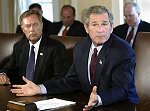
"I don't want to get a resolution which ties my hands," Bush told reporters after meeting with lawmakers on terrorism insurance. Bush insisted on a resolution that "sends a clear signal to the world that this country is determined to disarm Iraq, and thereby bring peace to the world."